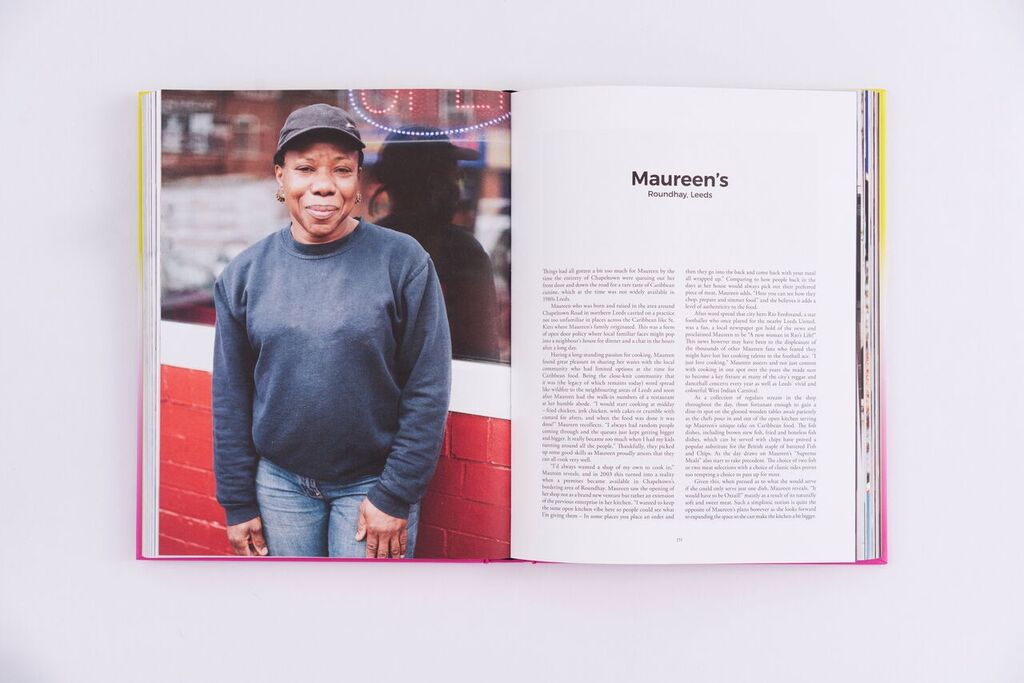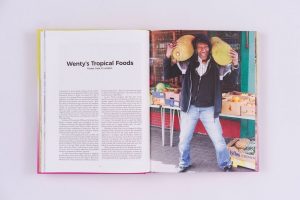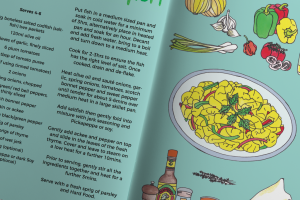
Belly Full is the brilliantly colourful book that takes us on a journey around the UK to the best and most beloved Caribbean eateries this country has to offer. Not only does it give recommendations of where to get your food from, but it explores the complex history of the Caribbean and those who migrated over to the UK. I sat down with photographer and creator of Belly Full, Riaz Phillips, ahead of his book launch to discuss Caribbean cuisine in Britain, the effects of gentrification and why he decided to self publish Belly Full.
“Belly Full is more of an archival anthology looking into the beloved Caribbean restaurants dotted around the UK”
Belly Full is nostalgic yet current; it’s crammed full of beautiful portraits of chefs and restaurant owners in their shops alongside personal and heart-warming anecdotes and insights into each restaurant. It isn’t a cookbook in the traditional sense of showing just recipes. Belly Full is more of an archival anthology looking into the beloved Caribbean restaurants dotted around the UK. As Riaz puts it, “cookery books are great but they end up in the kitchen, I wanted something that people would sit down and read and would be in libraries and archives.”
Belly Full does just that; it takes a snapshot into “archiving the culture as a whole”, in a time where traditions from back home are getting lost with each generation. This book perfectly captures Caribbean food in Britain today rather than retrospectively. Riaz explains, “most the things to do with black culture are usually heritage things…or black-and-white images of their parents at some dance or something, it’s never contemporary…they are all really retrospective.”
Not only does the introduction of Belly Full explore the similarities between cuisines from island-to-island but it expands on the intricate differences between them too. For example Trinidadian food differs from Jamaican food because of its “substantial Indian-Caribbean heritage and population”. And in Antigua “the national dish of fungie is similar to Italian cornmeal polenta”. Caribbean food covers a whole host of flavours.
Although each island is different, Riaz notes that there is a overlaps between food too. “When a lot of Caribbean people came over they were all just seen as Jamaican” because of Caribbeans historically being homogenised as well as well as the cuisines having actual crossovers, “Caribbean” has become the go-to term. But as Riaz notes, this can be beneficial for restaurants. “The Caribbean,” he says. “everyone knows what that is, whereas individual cuisines might not be as familiar….you just have to do what you have to do to get people in the door.”
“Unlike other cuisines, Caribbean food still hasn’t been fully adopted into the canon of international dishes by Britain”
Unlike other cuisines, Caribbean food still hasn’t been fully adopted into the canon of international dishes by Britain. Riaz explains, “these places have been around so long and the engagement with them is still a bit low compared to Asian food…’’ and attributes the lack of its national success to the authenticity of Caribbean food. “Some people think it’s the food, it’s not something that’s been compromised for a new audience… how you have Carribean and African food here, is how you’re going to get it when you go there.”

With the rise of gentrification affecting small businesses in the UK, I wanted to find out if Riaz thought it was impacting the caribbean restaurants (which are often nestled in historically black communities now facing gentrification) or even if it was contributing to the bastardisation of the cuisine. Riaz said it was “a double-edged sword” both helping and hindering the Caribbean cuisine. “With gentrification comes rising rents and landlords… I’ve talked to people directly who have had issues with getting a lease just based on who they are and what food they wanted to serve.’’
On one hand, the rising rent in gentrified areas is impacting small business, but for those who own their restaurants it’s increasing their profits. Riaz told me “people who own their premises, they aren’t going anywhere, for them gentrification is incredible. If they were trying to rely on black communities for their entire business, they would be out of business”. With gentrification comes a new type of client, someone “who’s more willing to engage in different cuisines, [with a] higher income… they’ve been on holidays to these places and tried the food, they are way more receptive to it back home”.

One of the most brilliant aspects of Belly Full is the fact that it’s self published. Riaz explained how he originally struggled with getting his book seen by publishing houses, and so, in the age of DIY projects, it seemed the best option to do it himself. “You can sit around and wait for those types of organisations to give you a chance… In this day and age of living with the internet it just doesn’t make any sense.’’ With self-publishing also comes creative control, “I didn’t have to condense my ideas to people who didn’t really understand it’’. If it wasn’t for his confident “just do it” attitude, Belly Full might not be what we see today.
Riaz puts it best,“food’s so important in the heritage of any region” and Belly Full perfectly captures the soul of caribbean culture in the UK . Buy the book for a nostalgic family member, or buy it to extend your knowledge of the caribbean cuisine, or just buy it to take a look into the lives of Caribbeans living in Britain.
Belly Full: Caribbean Food in the UK by Riaz Phillips, published by Tezeta Press and available to buy now.









